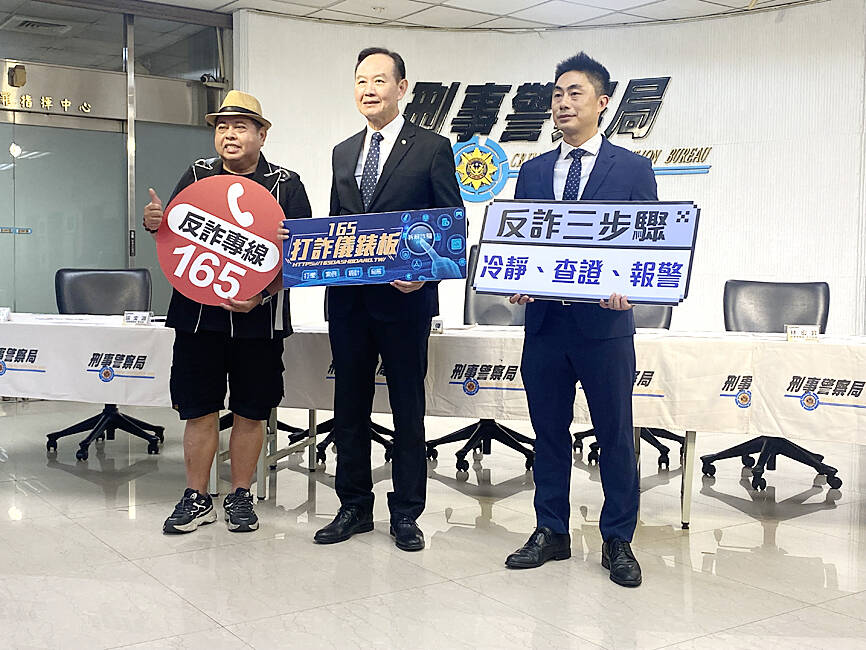The Criminal Investigation Bureau (CIB) yesterday warned of an increase in criminals using sophisticated artificial intelligence (AI) to impersonate police and prosecutors.
The bureau reported an average of 530 fraud cases per day last month, with daily losses reaching NT$275 million (US$9.13 million).
Fake police and prosecutor scams remain among the most damaging, CIB figures showed.

Photo: CNA
From January to last month, 3,114 fake police and prosecutor cases were reported, causing NT$6.2 billion in losses — nearly NT$2 million per victim on average, it said.
The scams often start with a call warning that a bank account is “under investigation,” then escalate to video calls using AI-generated police backdrops, uniforms and forged documents. Victims are then pressured into handing over bank cards or transferring funds for “monitoring.”
Officials cited the case of a woman in her 60s who was targeted multiple times.
She first received a call from someone posing as her son in urgent need of money, they said.
Weeks later, a fake bank officer claimed her account was flagged and transferred her to what appeared to be a police station, where AI-generated videos of “officials” convinced her to hand over NT$20 million in savings, they said.
People should treat contact they receive about their IDs, bank accounts or secrecy requirements as warning signs, the CBC said.
People should hang up immediately and seek verification by calling the 165 anti-fraud hotline, it said.

The Executive Yuan yesterday announced that registration for a one-time universal NT$10,000 cash handout to help people in Taiwan survive US tariffs and inflation would start on Nov. 5, with payouts available as early as Nov. 12. Who is eligible for the handout? Registered Taiwanese nationals are eligible, including those born in Taiwan before April 30 next year with a birth certificate. Non-registered nationals with residence permits, foreign permanent residents and foreign spouses of Taiwanese citizens with residence permits also qualify for the handouts. For people who meet the eligibility requirements, but passed away between yesterday and April 30 next year, surviving family members

The German city of Hamburg on Oct. 14 named a bridge “Kaohsiung-Brucke” after the Taiwanese city of Kaohsiung. The footbridge, formerly known as F566, is to the east of the Speicherstadt, the world’s largest warehouse district, and connects the Dar-es-Salaam-Platz to the Brooktorpromenade near the Port of Hamburg on the Elbe River. Timo Fischer, a Free Democratic Party member of the Hamburg-Mitte District Assembly, in May last year proposed the name change with support from members of the Social Democratic Party and the Christian Democratic Union. Kaohsiung and Hamburg in 1999 inked a sister city agreement, but despite more than a quarter-century of

Taiwanese officials are courting podcasters and influencers aligned with US President Donald Trump as they grow more worried the US leader could undermine Taiwanese interests in talks with China, people familiar with the matter said. Trump has said Taiwan would likely be on the agenda when he is expected to meet Chinese President Xi Jinping (習近平) next week in a bid to resolve persistent trade tensions. China has asked the White House to officially declare it “opposes” Taiwanese independence, Bloomberg reported last month, a concession that would mark a major diplomatic win for Beijing. President William Lai (賴清德) and his top officials

‘ONE CHINA’: A statement that Berlin decides its own China policy did not seem to sit well with Beijing, which offered only one meeting with the German official German Minister for Foreign Affairs Johann Wadephul’s trip to China has been canceled, a spokesperson for his ministry said yesterday, amid rising tensions between the two nations, including over Taiwan. Wadephul had planned to address Chinese curbs on rare earths during his visit, but his comments about Berlin deciding on the “design” of its “one China” policy ahead of the trip appear to have rankled China. Asked about Wadephul’s comments, Chinese Ministry of Foreign Affairs spokesman Guo Jiakun (郭嘉昆) said the “one China principle” has “no room for any self-definition.” In the interview published on Thursday, Wadephul said he would urge China to